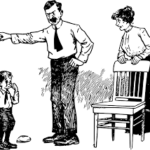In the sphere of parenting, discipline plays a key part in moulding a child’s growth and conduct. Recent research have emphasized a vital feature of successful discipline is avoiding physical punishment. This essay digs into the significant ramifications of physical discipline and underlines the need for alternate alternatives.
The Dark Side of Physical Punishment
Contemporary research underscores a clear link between physical punishment and detrimental developmental consequences in children. These ramifications encompass physical harm, heightened aggression, antisocial behavior, challenges in transitioning to adulthood, and an increased tolerance for violence. This emphasizes the lasting impact physical punishment can have on a child’s overall well-being. Beyond immediate repercussions, it poses a significant threat to a child’s safety and holistic development. The thin line between punishment and abuse is a critical consideration, with hundreds of children falling victim to physical abuse annually, facing severe injuries, mental anguish, or even loss of life. Recognizing children’s inherent right to protection, enshrined in laws worldwide, emphasizes the necessity for parents to comprehend this responsibility and explore alternatives to physical punishment.

Read also: Helicopter Parenting: Striking a Balance for Your Child’s Well-Being
A Risk to Safety and Development :
Physical punishment extends beyond immediate consequences, posing a significant threat to a child’s safety and comprehensive development. Parents must recognize the delicate line between punishment and abuse, as each year, tragically, hundreds of children become victims of physical abuse. These young individuals suffer severe physical injuries, endure mental anguish, and, in the most heartbreaking cases, lose their lives. Safeguarding children’s rights is imperative, with legislations globally acknowledging their inherent entitlement to protection from physical abuse. Parents bear the weight of this responsibility, necessitating an understanding of alternatives to physical punishment to ensure a child’s well-being.
Modeling Behavior and Setting Expectations :
While most parents naturally reject resorting to corporal punishment, it is vital to acknowledge that a child raised in an abusive environment faces a perilous future. Loving and non-abusive parenting is indispensable for a child’s holistic development, encompassing social, emotional, physical, and cognitive facets. Parents, as profound role models, impart crucial life lessons to their offspring. Teaching children resilience and sensitivity in facing life’s challenges requires modeling acceptable behavior, establishing clear expectations, and delineating limits. By fostering an environment rooted in love and non-abusiveness, parents cultivate a foundation for a child’s positive development, influencing their lifelong understanding of relationships and their ability to navigate the complexities of the world.
The Role of Parents :
Parents play a pivotal role as significant role models, imparting essential life lessons to their children. Teaching youngsters how to confront life’s challenges with perseverance and sensitivity is vital for their development across social, emotional, physical, and cognitive domains. Recognizing the impact of parental behavior on a child’s future, fostering a loving and non-abusive parenting approach becomes imperative. Modeling acceptable conduct, establishing clear expectations, and defining limits contribute to a child’s understanding of appropriate behavior and boundaries. By embracing these responsibilities, parents not only influence immediate behavior but also shape a child’s long-term social and emotional well-being, contributing to a positive and healthy upbringing.
The Age-Appropriate Approach :
Crucially, parents must tailor their disciplinary approaches to the child’s age, temperament, and maturity level. Children are not miniature adults; hence, they deserve age-appropriate discipline that respects their evolving needs and capabilities. The understanding that effective discipline varies across developmental stages emphasizes the importance of a nuanced approach. Recognizing and adapting to the unique characteristics of each developmental phase promotes a healthy parent-child dynamic. It ensures that disciplinary measures are constructive, fostering positive growth without causing undue stress or confusion. Acknowledging the individuality of each child contributes to an environment that nurtures their development, reinforcing a parent’s commitment to providing support tailored to the child’s changing requirements.
Seeking Professional Help :
Parents grappling with the temptation to physically abuse their children must urgently seek professional assistance. Taking timely action is crucial to preventing further harm to both the child and the parent. Professional support provides valuable guidance and resources, offering a lifeline for parents navigating challenging situations. Recognizing the potential severity of the situation and prioritizing the child’s safety is non-negotiable. Immediate placement in a secure environment becomes a paramount objective. By acknowledging the need for external help, parents demonstrate a commitment to breaking destructive patterns and creating a healthier, safer environment for both themselves and their children. Professional intervention is a proactive step towards fostering positive change and ensuring the well-being of the entire family unit.
conclusion:
In confronting the dark side of physical punishment, it is imperative for parents to recognize the thin line between discipline and abuse. The potential risks to a child’s safety and development underscore the importance of safeguarding children’s rights through alternatives to physical punishment. By modeling positive behavior, setting age-appropriate expectations, and seeking professional help when needed, parents play a pivotal role in nurturing a child’s well-being. Prioritizing non-abusive parenting is not just a legal obligation but a fundamental commitment to a child’s future, fostering resilience and positive growth in a safe and supportive environment.
FAQs
Q1: Why is physical punishment considered harmful for children?
A1: Physical punishment is deemed harmful as it can lead to various negative consequences, including increased aggression, antisocial behavior, and long-term psychological effects. Research consistently shows that alternative disciplinary methods, focusing on communication and understanding, are more effective in promoting positive behavior.
Q2: What are age-appropriate discipline strategies for children?
A2: Age-appropriate discipline considers a child’s developmental stage. For younger children, time-outs and clear explanations work well. As children grow, discussions about consequences, setting boundaries, and fostering open communication become more effective.
Q3: Are there legal consequences for physical punishment?
A3: Many jurisdictions have laws protecting children from physical abuse. Parents engaging in physical punishment that causes harm may face legal repercussions, emphasizing the importance of seeking non-violent disciplinary approaches.
Q4: How can parents break the cycle of resorting to physical punishment?
A4: Breaking the cycle involves recognizing triggers, seeking professional guidance, and adopting alternative strategies. Parenting classes, counseling, and building a support system can help parents develop healthier ways of disciplining their children.
Q5: What role do parents play in a child’s development?
A5: Parents are primary role models, influencing a child’s social, emotional, and cognitive development. By modeling positive behavior, setting expectations, and providing a loving environment, parents shape a child’s understanding of the world and contribute significantly to their overall well-being.





